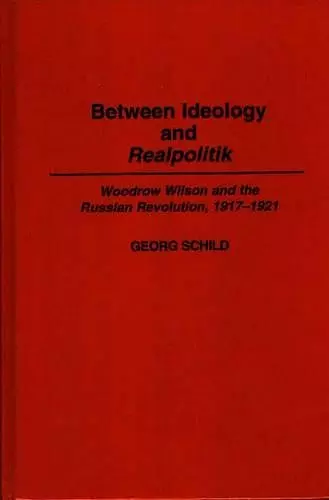Between Ideology and Realpolitik
Woodrow Wilson and the Russian Revolution, 1917-1921
Format:Hardback
Publisher:Bloomsbury Publishing PLC
Published:27th Jun '95
Currently unavailable, and unfortunately no date known when it will be back

"For decades historians have tried to understand the ambivalences characteristic of Woodrow Wilson's policy vis-a-vis revolutionary Russia. In his clearly written and well reasoned study, Schild arrives at original interpretations based on the vast array of previous research and analysis. This synthesis has thus become a valuable contribution to the scholarly discussion of Wilson's motives for intervening in the Russian civil war and for maintaining his vision of a united and democratic Russia." -- Professor Klaus Schwabe, Chair, Modern History University of Technology, Aachen, Germany "It is a solid work and makes a substantial contribution to the literature concerning the Wilson presidency. It will serve as a useful tool for advanced scholars and will provide an important point of departure for undergraduates studying Woodrow Wilson and American policy toward Russia." -- Karen A.J. Miller, Assistant Professor Department of History, Oakland University
In this concise interpretation of Wilson's Russian policy, Schild challenges the belief that Wilson's response to the 1917 October Revolution was exclusively ideological. Wilson's belief in the superiority of liberalism over totalitarianism was so strong that he expected democratic forces in Russia to take power without outside aid.
In this concise interpretation of Wilson's Russian policy, Schild challenges the belief that Wilson's response to the 1917 October Revolution was exclusively ideological. Contrary to the belief that when Wilson sent American troops to intervene in 1918, his goal was to establish a democratic order in Russia, this book shows that his actions were more pragmatic. Wilson's belief in the superiority of liberalism over totalitarianism was so strong that he expected democratic forces in Russia to take power without outside aid. At the Paris Peace Conference, he rejected suggestions for an anti-Soviet crusade. His July 1918 decision to intervene was not a part of Wilson's ideology. It was based on an effort to maintain unity with Britain and France during the final phase of World War I. Wilson did, indeed, have a liberal anti-Bolshevik agenda. However, his belief in the superiority of liberalism over totalitarianism was so strong that he expected democratic forces in Russia to take power without any outside aid. At the Paris Peace Conference, he rejected all suggestions for a Western anti-Soviet crusade or for a division of Russia. His 1918 decision to intervene was not part of Wilson's ideological confrontation with the Bolsheviks. It was based on an effort to maintain unity with the British and French governments during the final phase of World War I. Wilson's Russian policy, the author concludes, was determined both by his ideological anti-Bolshevism and pragmatic demands for alliance cohesSchild has offered a thoughtful analysis of a diffucult and complicated problem. * The International History Review *
ISBN: 9780313295706
Dimensions: unknown
Weight: 397g
192 pages